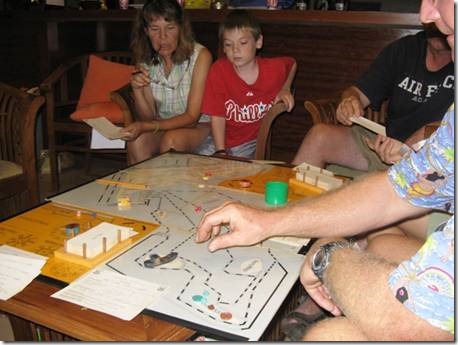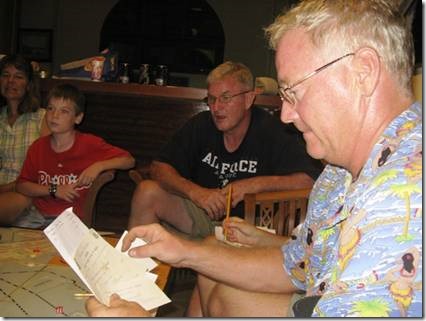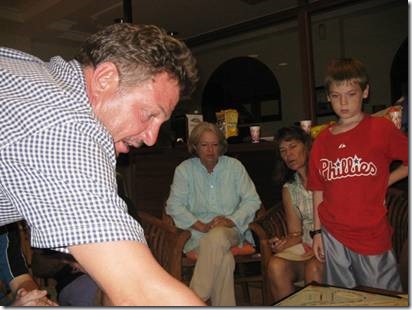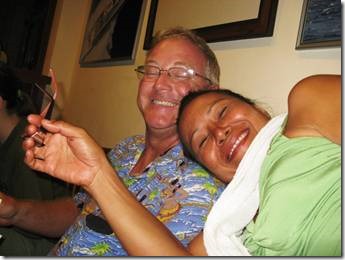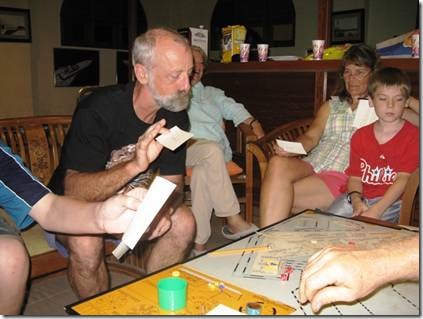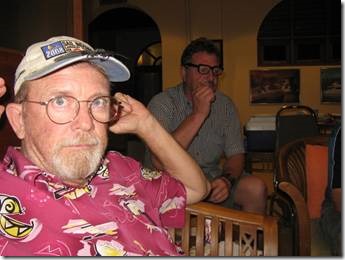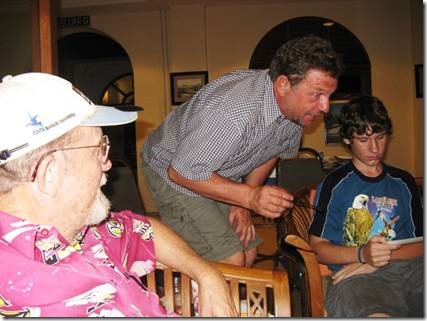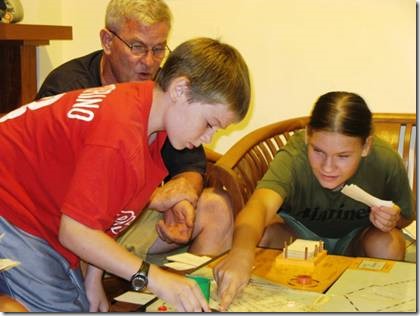About to leave Tanjong City Marina, George Town, Penang, Malaysia
Hi All,
We are waiting until the current calms down so we can safely cruise away from the marina. That should be in about an hour. Our passage today is only 20 miles so we should be anchoring by lunch time.
Last week we had a potluck dinner and then spent an enjoyably frustrating evening playing Patrick’s board game “Tuvalu! Tuvalu!” which is actually a real place 2,000 miles north of New Zealand. None of the Roanoke Valley homework reports seemed to have covered the island so I had certainly never heard of it. I asked Patrick to write up a description of the game which truly is his creation. And since Patrick is British all of the spelling reflects that.
Ru
DoraMac
Tuvalu! Tuvalu!
“I signed up with VSO (a non-government version of the Peace Corps) in 1985 and was posted to a crop development project on Vaitupu Island, Tuvalu, in October. There I met Elizabeth, who was teaching at the national secondary school. My project was badly flawed from the beginning and needed a lot of modifications to get it to work at all. And because most of the supplies had to come from the UK (since it was paid for by UK aid) there was up to an 18 month delay in getting the necessary equipment. In practice the project was about 6 weeks of work spread thinly over 2 years. I got very bored.”
Beth and her son were the game winners. But then she was a test pilot, taught at Annapolis and was a candidate for the astronaut program! Beth, her husband and 3 children live on a boat that is now at the yard at Batu Maung while they stay in an apartment in town. Their land home is in Pennsylvania. The 3 children are “boat schooled.” The two oldest children are in college, one at Annapolis and one at the Air Force Academy.
“The original idea of the game was to explain how frustrating it was to be marooned on an outer island, at the mercy of the (unreliable and unpredictable) ship. I also tried to build in the idea of being reliant on (unreliable and unpredictable) colleagues based elsewhere. My immediate boss, Neil, was based in Vaitupu and was terrific. (We are still firm friends, and Neil and his Tuvaluan wife Nafiata from Nanumaga have stayed with us on the boat several times.) But we had lots of problems with civil service bureaucrats in both Funafuti (the capital island, some 70 miles away) and Fiji.
The TV series “Yes Minister” was (and is) a firm favourite. In the series, civil servants are awarded ‘brownie points’ for meritorious service. (In the UK there are Boy Scouts, but if you join the scouting movement before (say) the age of 11 then you are a Cub. The equivalents for girls are the Girl Guides and the Brownies.) The aim of the game is to amass sufficient Brownie Points (the target usually arbitrarily set at 400) to earn a Ticket Out Of Tuvalu (TOOT). Meanwhile, inevitable illnesses and a creeping sense of futility tends to sap any original enthusiasm, which is measured by the Enthusiasm Quotient. At the start of the game, every player starts with an Enthusiasm Quotient of 200. A player with no enthusiasm and no Brownie Points is known as a zero rater and is doomed.”
Matt was minus hundreds of enthusiasm points and had lots of paperwork that never seemed to go away.
“Players are given aid projects to complete on one or more of the outer islands. To complete the project they must get themselves and their cargo to the island, and then await the return of the ship. Sometimes the ship returns almost instantly, sometimes it doesn’t return at all. The ship’s moves are based on every player’s throw of two dice, but schedules are determined by ‘spinners’ on the board that are a bit wonky. (The spinners are made from the lid of a sterile syringe case, plasticine, a small galvanised bolt and a drawing pin. They are not very well balanced.) Cheating is commonplace and part of the game. The ship is also affected by ‘Shipping Reports’, which detail the latest breakdown or unexpected diversion. Sometimes the ship breaks down so thoroughly that is has to go to Fiji for repairs. Sometimes a ship from Kiribati is chartered for a couple of voyages. On one occasion we had no ship call at Vaitupu for three months, so the game doesn’t exaggerate too outrageously.”
Patrick explaining the rules, Elizabeth in the blue shirt and tan trousers, Beth and her son Paying Attention.
Matt and Yai not paying attention.
We had met Matt and Yai in Sebana Cove. It is really nice to get to revisit with friends so good-byes aren’t as hard as they might be.
“Every anecdote referred to in the game was based on fact, although sometimes a bit of hyperbole crept in. I started Tuvalu! Tuvalu! in 1986 and finished it in mid 1987. Since then we’ve played it with friends perhaps once or twice a year. I haven’t changed anything since 1987, although there are lots of things that could be improved. The probabilities were not worked out accurately enough and there are scores of anecdotes that could be added. But enough is probably enough. A friend of a friend in Fiji produced a commercial version of the game called ‘Paradise’ that apparently sold in small numbers, but I’ve never seen a copy.”
“Sometimes, like last week, (when we played here at the marina) the game works quite well, everyone gets the idea and at least seems to be having a good time. Very occasionally we play with someone who doesn’t like to lose and who has a hard team dealing with the idea that if the ship doesn’t co-operate, then they are going to be stuck on some obscure atoll whilst a rival gets the TOOT and triumphs. Another technique is to abandon any hope of winning, and instead to remain on the capital Funafuti amassing powerful cards with which the careers of others can be demolished. Yes, that actually happened too, or at least that’s how it seemed to us.”
Roger had played the game in the past. He decided to hang out at the “hotel” and to cheat too. His way of dealing with the “rules of the game.”
Patrick looking perplexed and Randal looking way beyond perplexed. Luckily we had Beth’s older son on our team. He seemed to pay attention better.
“In 1997 we first went back to Tuvalu with Labarque. To our amazement there was a new concrete ‘fishing harbour’ built on Vaitupu. It was there because the Japanese government had promised to double the size of the school. To help get the necessary heavy machinery and concrete ashore through the reef passage, they’d built a temporary harbour from rocks in baskets. This they unwisely announced was a “Fishing Harbour, a Symbol of Friendship between Japan and Tuvalu”. Shortly afterwards it was washed away in a storm. A Japanese TV crew arrived, filmed the wreckage and interviewed the locals. Face had to be saved, so a new “Symbol of Friendship” was built at a cost of AUS$6M, on an island with 1200 permanent residents. Labarque was the first yacht ever to use the harbour, and, three years later, the third. (The second was a Bahai missionary boat. The harbour is not big enough to accommodate the inter-island ship or the national patrol boat.) In 2006 we went back to Tuvalu again, but yachts are now banned from all the Outer Islands. As far as we know the Symbol of Friendship is still going strong.”
“Hope this helps you with your blog.”
Patrick
Randal watches as Patrick explains something to Jurney. I’m not really sure how to spell his name but he was a very pleasant teenager.
The rest of Beth’s family. Patrick and Elizabeth had met them in Batu Maung in the boat yard. That was the same boat yard, Pen Marine where we’d spent our first visit to George Town. And also the home of Little Brown Dog.

